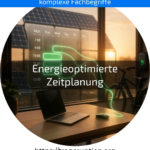Energy-optimised scheduling is particularly at home in the areas of Sustainability and Environment 4.0, Industry and Factory 4.0 and the Internet of Things. The term describes methods and tools that are used to organise processes in such a way that as little energy as possible is consumed - whether electricity, heat or other resources. The aim is to plan work processes and production times sensibly in order to reduce energy requirements.
A good example: A factory has many machines running that require a lot of energy at certain times of the day. With energy-optimised scheduling, the machines are used in such a way that they do not all run at the same time if possible - for example, to avoid expensive electricity peaks or to take advantage of favourable times of day with lower energy prices. This not only saves costs, but also protects the environment.
This principle is also used in the Internet of Things: smart household appliances switch on automatically when a lot of renewable energy is available. In this way, companies and private individuals use energy-optimised scheduling to reduce the use of resources and expenditure - and benefit the environment.






